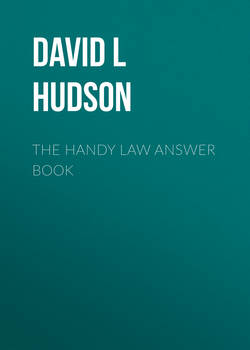Читать книгу The Handy Law Answer Book - David L Hudson - Страница 58
На сайте Литреса книга снята с продажи.
What is the full faith and credit clause?
ОглавлениеArticle IV, Section 1 of the Constitution provides that “full faith and credit shall be given in each State to the public acts, records, and judicial proceedings of every other state.” This is the provision that provides that judgments in one state are generally respected by other states. It helped to create a single nation out of disparate states. The clause states:
Full faith and credit shall be given in each State to the public acts, records, and judicial proceedings of every other state. And the Congress may by general laws prescribe the manner in which acts, records and proceedings shall be proved, and the effect thereof.
LegalSpeak: Gonzalez v. Reich (2005)
In assessing the validity of congressional regulation, none of our Commerce Clause cases can be viewed in isolation. As charted … our understanding of the reach of the Commerce Clause, as well as Congress’ assertion of authority thereunder, has evolved over time. The Commerce Clause emerged as the Framers’ response to the central problem giving rise to the Constitution itself: the absence of any federal commerce power under the Articles of Confederation. For the first century of our history, the primary use of the Clause was to preclude the kind of discriminatory state legislation that had once been permissible. Then, in response to rapid industrial development and an increasingly interdependent national economy, Congress “ushered in a new era of federal regulation under the commerce power,” beginning with the enactment of the Interstate Commerce Act in 1887, 24 Stat. 379, and the Sherman Antitrust Act in 1890, 26 Stat. 209, as amended, 15 U.S.C. § 2 et seq.
Cases decided during that “new era,” which now spans more than a century, have identified three general categories of regulation in which Congress is authorized to engage under its commerce power. First, Congress can regulate the channels of interstate commerce. Second, Congress has authority to regulate and protect the instrumentalities of interstate commerce, and persons or things in interstate commerce. Third, Congress has the power to regulate activities that substantially affect interstate commerce. Only the third category is implicated in the case at hand.
Our case law firmly establishes Congress’ power to regulate purely local activities that are part of an economic “class of activities” that have a substantial effect on interstate commerce. As we stated in Wickard, “even if appellee’s activity be local and though it may not be regarded as commerce, it may still, whatever its nature, be reached by Congress if it exerts a substantial economic effect on interstate commerce.” We have never required Congress to legislate with scientific exactitude….
One need not have a degree in economics to understand why a nationwide exemption for the vast quantity of marijuana (or other drugs) locally cultivated for personal use (which presumably would include use by friends, neighbors, and family members) may have a substantial impact on the interstate market for this extraordinarily popular substance. The congressional judgment that an exemption for such a significant segment of the total market would undermine the orderly enforcement of the entire regulatory scheme is entitled to a strong presumption of validity. Indeed, that judgment is not only rational, but “visible to the naked eye,” under any commonsense appraisal of the probable consequences of such an open-ended exemption.
